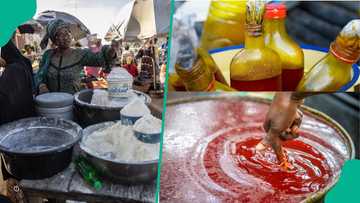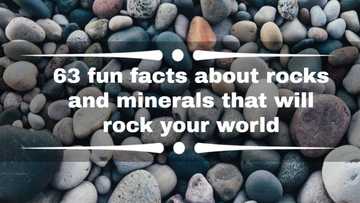Natural resources and solid minerals in Nigeria and their locations
Nigeria is a huge country rich in natural resources. The Nigerian economy highly depends on these resources, which is why they are a huge part of many people's everyday lives, especially those who work in the industrial sphere. Here is the list of mineral resources in Nigeria and their locations, along with interesting facts about them.

Source: UGC
Mineral resources are materials found in nature that are used to create many everyday products. They are typically found as compounds, such as rocks, ores, and minerals. Examples of mineral resources include copper, aluminium, iron, and gold. These resources are essential for many industrial and manufacturing processes and are also used in some consumer products, such as jewellery and electronics.
Mineral resources in Nigeria and their locations
Mineral resources are essential to our everyday life and are used in a variety of ways. Minerals are used in the production of many products such as construction materials, electronics, and medical devices.
They are also used in the production of energy, including nuclear energy. By understanding the importance of mineral resources and how to use them responsibly, we can help ensure their sustainability for future generations.
Solid minerals in Nigeria and their locations
The essential question in Nigeria nowadays is where to find mineral resources. Here is the list of 36 states in Nigeria and their mineral resources.
| No | State | Natural resources |
| 1 | Abia | Gold, Lead/Zinc, Limestone, Oil/Gas & Salt |
| 2 | Abuja | Cassiterite, Clay, Dolomite, Gold, Lead/Zinc, Marble & Tantalite |
| 3 | Adamawa | Bentonite, Gypsum, Kaolin & Magnesite |
| 4 | Akwa Ibom | Clay, Lead/Zinc, Lignite, Limestone, Oil/Gas, Salt & Uranium |
| 5 | Anambra | Clay, Glass-Sand, Gypsum, Iron-ore, Lead/Zinc, Lignite, Limestone, Phosphate & Salt |
| 6 | Bauchi | Gold, Cassiterite (tine ore), Columbite, Gypsum, Wolfram, Coal, Limestone, Lignite, Iron-ore & Clay |
| 7 | Bayelsa | Clay, Gypsum, Lead/Zinc, Lignite, Limestone, Manganese, Oil/Gas & Uranium |
| 8 | Benue | Barite, Clay, Coal, Gemstone, Gypsum, Iron-Ore, Lead/Zinc, Limestone, Marble & Salt |
| 9 | Borno | Bentonite, Clay, Diatomite, Gypsum, Hydro-carbon, Kaolin & Limestone |
| 10 | Delta | Clay, Glass-sand, Gypsum, Iron-ore, Kaolin, Lignite, Marble & Oil/Gas |
| 11 | Ebonyi | Gold, Lead/Zinc & Salt |
| 12 | Edo | Bitumen, Clay Dolomite, Phosphate, Glass-sand, Gold, Gypsum, Iron-ore, Lignite, Limestone, Marble & Oil/Gas |
| 13 | Ekiti | Feldspar, Granite, Kaolin, Syenite & Tatium |
| 14 | Enugu | Coal, Lead/Zinc & Limestone |
| 15 | Gombe | Gemstone & Gypsum |

Read also
South African billionaire solidifies status as Africa's richest man, Dangote gets new position
Below is a table with more mineral resources and the state where they are found.
| No | State | Natural resources |
| 16 | Imo | Gypsum, Lead/Zinc, Lignite, Limestone, Marcasite, Oil/Gas, Phosphate & Salt |
| 17 | Cross River | Barite, Lead/Zinc, Lignite, Limestone, Manganese, Oil/Gas, Salt & Uranium |
| 18 | Jigawa | Butyles |
| 19 | Kaduna | Amethyst, Aqua Marine, Asbestos, Clay, Flosper, Gemstone, Gold, Graphite, Kaolin, Hyanite, Mica, Rock Crystal, Ruby, Sapphire, Sihnite, Superntinite, Tentalime, Topaz & Tourmaline |
| 20 | Kano | Cassiterite, Copper, Gemstone, Glass-sand, Lead/Zinc, Pyrochinre & Tantalite |
| 21 | Kastina | Kaolin, Marble & Salt |
| 22 | Kebbi | Gold |
| 23 | Kogi | Cole, Dolomite, Feldspar, Gypsium, Iron-ore, Kaolin, Marble, Talc & Tantalite |
| 24 | Kwara | Cassiterite, Columbite, Feldspar, Gold, Iron-ore, Marble, Mica & Tantalite |
| 25 | Lagos | Bitumen, Clay & Glass-sand |
| 26 | Nasarawa | Amethyst (Topaz Garnet), Barytex, Barite, Cassirite, Chalcopyrite, Clay, Columbite, Coking Coal, Dolomite/Marble, Feldspar, Galena, Iron-ore, Limestone, Mica, Salt, Sapphire, Talc, Tantalite, Tourmaline Quartz& Zireon |
| 27 | Niger | Gold, Lead/Zinc & Talc |
| 28 | Ogun | Bitumen, Clay, Feldspar, Gemstone, Kaolin, Limestone & Phosphate |
| 29 | Ondo | Bitumen, Clay, Coal, Dimension Stones, Feldspar, Gemstone, Glass-Sand, Granite, Gypsium, Kaolin, Limestone & Oil/Gas |
| 30 | Osun | Columbite, Gold, Granite, Talc, Tantalite & Tourmaline |
| 31 | Oyo | Aqua Marine, Cassiterite, Clay, Dolomite, Gemstone, Gold, Kaolin, Marble, Silimonite, Talc & Tantalite |
| 32 | Plateau | Barite, Bauxite, Bentonite, Bismuth, Cassiterite, Clay, Coal, Emeral, Fluoride, Gemstone, Granite, Iron-ore, Kaolin, Lead/Zinc, Marble, Molybdenite, Phrochlore, Salt, Tantalite/Columbite, Tin & Wolfram |
| 33 | Rivers | Clay, Glass-Sand, Lignite, Marble & Oil/Gas |
| 34 | Sokoto | Clay, Flakes, Gold, Granite, Gypsum, Kaolin, Laterite, Limestone, Phosphate, Potash, Silica Sand & Salt |
| 35 | Taraba | Lead/Zinc |
| 36 | Yobe | Soda Ash & Tintomite |
What mineral resources are found in Nigeria?

Source: UGC
Nigeria is blessed with plenty of natural goods, which are the country's primary income source. Some of the major minerals include:
1. Coal
Nigeria has a significant amount of coal reserves, with estimates of around 2 billion metric tons. Most of the coal deposits are located in the northern and eastern parts of the country.
While most of the coal is used for energy production, some are used in manufacturing. Nigeria is working to increase its coal production to meet the country's growing energy demand.
In recent years, the government has invested in upgrading the coal industry and has signed agreements with various foreign companies to develop the sector. Coal remains a major energy source for Nigeria, and the country is actively working to increase its production and use of the resource.
2. Petroleum
Nigeria is a major petroleum producer with large reserves of crude oil and natural gas. Petroleum has been an important source of revenue for the country since the 1960s when it was first discovered.
Despite the challenges of environmental degradation, theft, and mismanagement of resources, the oil industry in Nigeria remains a major sector of the economy. The country is the fifth-largest producer of oil in Africa and has the largest oil reserves on the continent.
Investment in the sector has led to increased production, and Nigeria is now a major exporter of crude oil. However, the country still faces challenges with the mismanagement of resources and corruption, which have led to environmental degradation and hindered economic growth.
Despite these issues, Nigeria is still a major player in the global oil market and has the potential to become an even larger player in the future.
3. Rock salt
One mineral resource with the highest demand in Nigeria is rock salt. It combines table salt, caustic soda, chlorine, hydrogen peroxide, and various other materials.
In recent years, Nigeria has seen a rise in the production and sale of iodized salt, a great step for improving public health. In addition, several small-scale artisanal salt producers in Nigeria traditionally produce salt for local consumption.

Read also
CNG: NNPC launches 6 new filling stations for Nigerians to buy fuel priced at N200, gives location
4. Iron ore
Nigeria is blessed with abundant natural resources, including vast iron ore deposits. It's said that the purest deposits can be found in Itakpe, located in Kogi State. Other states where iron ore can be found are Abia, Anambra, Bauchi, Benue, Kwara, Plateau and Nasarawa.
Iron ore is a mineral composed of various chemical compounds; when heated with a reducing agent—like coke—it forms metallic iron. These ores are found within sedimentary rocks, created by accumulating different sediments over time. The two main minerals extracted from these ores are hematite and magnetite oxides.
5. Gemstone

Source: UGC
There are several unique and beautiful gemstones found in Nigeria. The most popular include sapphires, aquamarine, tourmaline, topaz, garnet, and zircon.
Many of these gems are mined in the country's northwestern region, where they are known for their high quality and stunning colours. Additionally, a large variety of semi-precious stones are available in Nigeria, such as quartz, calcite, and aventurine.
6. Diamond
Nigeria is home to a wide variety of mineral resources, including diamonds. The mineral was discovered in Katsina state. The Nigerian government is currently working to develop the industry and increase production, focusing on the mining and cutting of stones to create a more profitable industry.
7. Gypsum
There are several gypsum mineral resources in Nigeria. The most prominent is the Sokoto-Gwandu Gypsum Deposit, located in Sokoto State. This deposit is estimated to contain over 5.5 million metric tons of gypsum with a purity of up to 90%.
Other notable gypsum resources in Nigeria include the Uburu Gypsum Deposit in Ebonyi State and the Ogwashi-Uku Gypsum Deposit in Delta State. These deposits contain high-grade gypsum with an estimated reserve of over 2 million metric tons. Additionally, there are several smaller gypsum resources scattered throughout Nigeria.
8. Talc
Nigeria is a rich source of talc mineral resources. Talc deposits are estimated to be about 4 billion metric tonnes in Nigeria. They are mainly located in the northern states of Nigeria, including Kogi, Nasarawa, Niger, Osun, and Oyo.
The largest talc deposit in Nigeria is located in Ilesha, Osun State. Talc can be used in many industries, such as rubber, paper, paint, plastics, and construction materials.
9. Cobalt
Cobalt is a strategic mineral, an important component used in electroplating and battery manufacturing. Regarding cobalt mineral deposits, Nigeria has some of the largest cobalt reserves in Africa, primarily located in the Northern region.
The primary cobalt mineral mined in Nigeria is cobaltite, a sulfide ore containing cobalt and other minerals such as nickel and copper. Additionally, some cobalt is produced as a byproduct of nickel and copper mining in Nigeria.
10. Gold
Gold mining is a major source of employment in many parts of the country, and gold is often used as a form of currency. Gold can be found in several country areas, including Abia, Abuja, Bauchi, Ebonyi, Edo and Sokoto.
Mineral resources in Nigeria are a source of income and essential resources to sustain the country's development. They also contribute to the local economy by providing employment opportunities and helping improve citizens' quality of life.
READ ALSO: How long does it take to boil water? Answering your questions
Legit.ng recently published an article answering your questions on how long it takes to boil water. The time it takes to boil water depends on several factors, including the type of heat, the amount of liquid, and the container used.
It typically takes around 3-5 minutes to boil water, depending on the size of the pot or container you are using and the stove or burner temperature. Boiling is when water reaches its maximum temperature (212°F or 100°C) and vaporises into steam.
Source: Legit.ng

Regina Stets (SEO writer) Regina has been working as a reporter since 2017. She has written numerous publications on various topics, including celebrities, lifestyle, news, and many more. In addition to writing, she is also an English teacher, translator and a volunteer. Her interests are art, psychology and travelling, and she believes in equal rights for everyone. reginastets@gmail.com

Adrianna Simwa (Lifestyle writer) Adrianna Simwa is a content writer at Legit.ng where she has worked since mid-2022. She has written for many periodicals on a variety of subjects, including news, celebrities, and lifestyle, for more than three years. She has worked for The Hoth, The Standard Group and Triple P Media. Adrianna graduated from Nairobi University with a Bachelor of Fine Arts (BFA) in 2020. In 2023, Simwa finished the AFP course on Digital Investigation Techniques. You can reach her through her email: adriannasimwa@gmail.com






